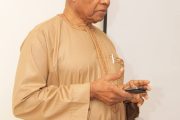Raiding the house of judges by operatives of state security has, naturally, transformed into a major national controversy. While many seem to agree that some elements in the judiciary are simply corrupt and perverting the cause of justice for that reason, they cannot come to terms with the image of judges being released from detention by the Department of State Security. It reminds many of the days of NSO in 1984. It is not the sort of image President Buhari should seek for himself or the government because image is everything. This feeling cannot be dismissed. It is not the individual judges involved that anybody is defending but the need for care and caution in approaching anti-corruption war in the judiciary so that it does not become an albatross. The law of unintended consequences can overwrite whatever real cases of corruption that might have been the objective of the raid. This exercise can be lost to interpretations and misinterpretations, with dire consequences, usually for those who are already too weak in the society to help themselves.
It would be difficult for a very long time to understand why the president did not stop the raiding of the judges after having complained openly that looters are the ones organising insurgency against the regime. What is the guarantee that the looters he had in mind would not band together with those who might perceive themselves in the judiciary to be under attack, all of which could complicate an already complicated state of the nation? How does the regime handle all these in relation to excruciating experience of a combination of scarcity of money and food at the same time in the country? There seems to be a clear failure to convert local and global solidarity with a man of integrity to elevated statesmanship. And this failure is so tragic in that what appears to be a resistance to the anti-corruption war now was anticipated and warned against by especially Dr. Mahmud Moddibo Tukur, the late radical ABU, Zaria Historian over thirty years ago in a letter addressed to this same president.
It is all very saddening because a country which can make global primacy in a most stunning manner is being held back by the most elementary and the most pedestrian issues of state. As usual in an agrarian society such as contemporary Nigeria where the bulk of the citizens remain uncaptured and state processes are still not fully developed, all eyes are on the government and, by implication, on the leader to provide leadership in this wise. Both the masses and even the notables expect the leader to epitomise the Philosopher – King, ruling by the power of knowledge and wisdom or experience.
That puts President Buhari as the sum total of the hopes, aspirations and fears of millions of Nigerians who would never meet him one on one but expect that they would get their own share of the benefits of nationhood through his works. The president is the sort of person the masses are justified to expect to think so. This point requires no evidence to be believed. An oil minister who has not been found to have stashed money in several bank accounts is enough evidence in the Nigerian context. Even if he has stashed any money away, the brilliance in doing so without any of his opponents detecting it all these years makes him even more attractive as far as the great expectations is concerned.
Unfortunately, however, the president keeps sending signals that the emphasis on father figure, integrity and incorruptibility that favoured him in the 2015 presidential selection and the subsequent presidential race was a mistake. The president suggests now and then that other important assets in leadership such as mindset, consultation, carrying people along and managerial style do not count or matter.
First of these signals must be the president’s mechanical calibration of the problems of the Nigerian society into security, economy and corruption, thereby losing the battle of a powerful narrative that could have fired and sustained popular imagination. That has left the stage for other players to come and plant alternative stories to a point that national unity is not even taken for granted. With a discourse of corruption that sees it in and of itself, completely outside of systemic dynamics, the government was sure to get stuck half way. The only way to fight corruption and succeed in a society in which almost everyone is corrupt is to put it in context in the assembly of the elite, get them to endorse an elite pact on it and, by doing so, dodge being seen as being on a vendetta or in pursuit of an exercise in puritanism. Without doing so, the president has reduced his options to the temptation to resort to instinctive and anger informed options as in the case of this raid on judges.
As things are now, it is difficult to see if the president has an alternative to forming a government of national unity. With the time left and with the disarray going on now, this seems the surer manner of still being able to calm the nation as to leave any landmarks by 2019. In that context, a government of national unity is something he needs to think about.




























